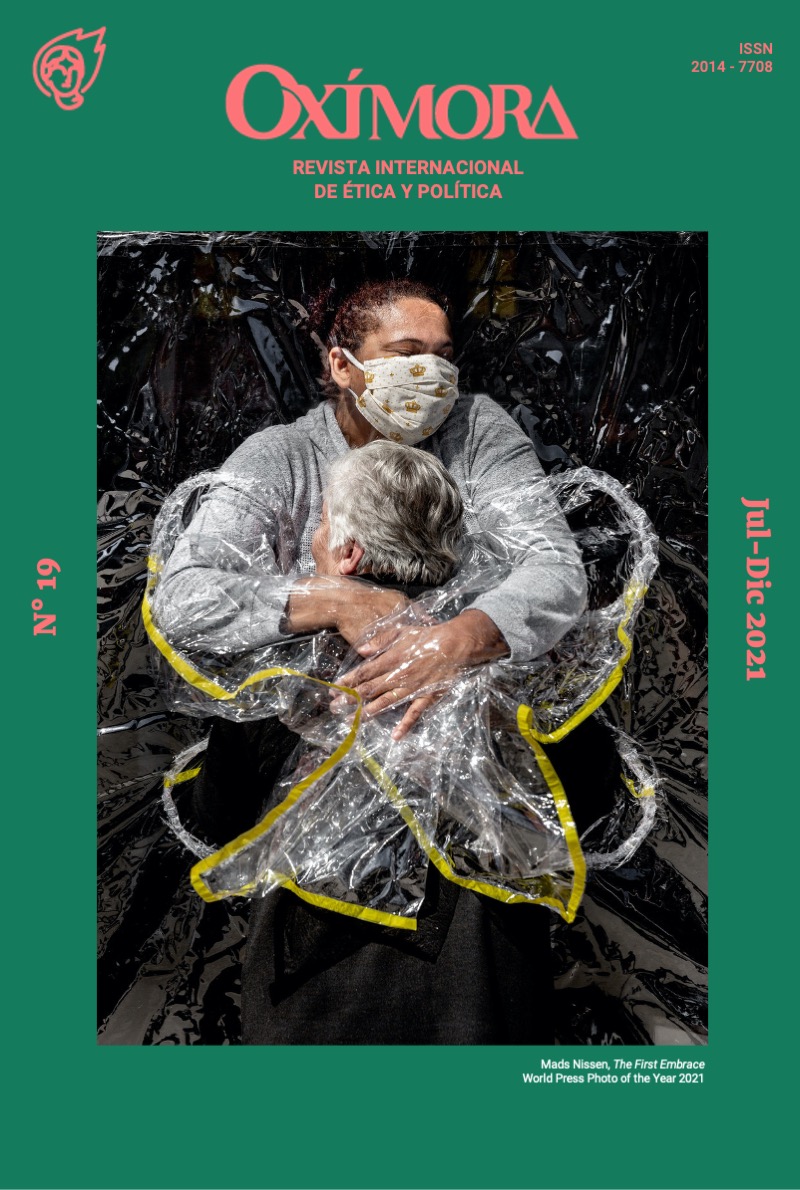«Morbid States». A necropolitical analysis of fibromyalgia in contemporary societies
DOI:
https://doi.org/10.1344/oxi.2022.i19.34241Keywords:
Necropolytics, Fibromyalgia, Biopower, GenderAbstract
Each society has its own particular diseases and those diseases speak the truth of each society. The scenario we are living today locates life, any life, “between the explosion and the outbreak” (López Petit, 2015), where there is no distinction between life and death, but instead there is debility as a continuum. Between the explosion and the outbreak there are bodies in exhaustion. Bodies that show not only the debilitating aspects of neoliberalism but the economies that sustain it. This article introduces the concept of «Morbid States» as a twofold condition of living that incorporates, on the one hand, contemporary affective regimes of self-precariousness and self-responsibility that situate disease as an individual state («morbid states» in lower letters); on the other hand, the concept («Morbid States» in capital letters) refers to the necro-administration and use of morbidity through State structures I call «morbopolitics», which enable the production of the disease itself. In this concentric circle, fibromyalgia is introduced as a gendered disease that has become the ultimate source for the extraction of human vitality.
References
Agamben, Giorgio. (1995). Homo Sacer. Sovereign Power and Bare Life. Stanford, California: Stanford University Press.
Ahmed, Sara. (2004). Affective Economies. Social Text, 79, 22(2), 117-139. DOI: 10.1215/01642472-22-2_79-117
Ahmed, Sara. (2015). La política cultural de las emociones. Programa Universitario de Estudios de Género. México: Universidad Nacional Autónoma de México.
Ahmed, Sara. (2019). La promesa de la felicidad. Una crítica cultural al imperativo de la alegría. Buenos Aires: Caja Negra.
Berardi, Franco. «Bifo». (2017). Fenomenología del fin. Sensibilidad y mutación conectiva. Buenos Aires: Caja Negra.
Berlant, Lauren. (2007). Slow Death (Sovereignty, Obesity, Lateral Agency). Critical Inquiry, 33(4), 754-780. DOI: 10.1086/521568
Berlant, Lauren. (2011). Cruel Optimism. Durham: Duke University Press.
Campillo Artero, Carlos & Salvador Peiró. (2009). Enfermedades raras, medicamentos huérfanos: El valor de la orfandad. Gestión Clínica y Sanitaria, 11(4), 119-126.
Emmelhainz, Irmgard. (2016). Tiranía del sentido común: La reconversión neoliberal de México. México: Paradiso.
Foucault, Michel. (1998). Historia de la sexualidad I. La Voluntad de Saber. Madrid: Siglo Veintiuno editores. (U. Guiñazú, Trad.).
Foucault, Michel. (2006). Genealogía del racismo. Brasil: Altamira.
Gago, Verónica. (2015). La razón neoliberal. Economías barrocas y pragmática popular. Madrid: Traficantes de sueños.
Gómez-Barris, Macarena. (2017). The Extractive Zone: Social Ecologies and Decolonial Perspectives. Durham: Duke University Press.
Han, Byung-Chul. (2012). La Sociedad del Cansancio. Barcelona: Editorial Herder. (Arantzazu Saratxaga Arregi y Alberto Ciria, Trad.)
López Petit, Santiago. (2014). Hijos de la Luna. Barcelona: Ediciones Bellaterra.
López Petit, Santiago. (2017). La politización del malestar en una sociedad terapéutica. Curso En Tu Interior, Malestar social, (des)politización y psicologías críticas. Accesible en: https://soundcloud. com/traficantesdesue-os/la-politizacion-del-malestar
Lorey, Isabell. (2016). Estado de inseguridad. Gobernar la precariedad. Madrid: Traficantes de sueños.
Medina Doménech, Rosa María & María Rosón. (2017). Resistencias emocionales. Espacios y presencias de lo íntimo en el archivo histórico. Arenal, 23, 407-439.
Puar, Jasbir. K. (2009). Prognosis Time: Towards a Geopolitics of Affect, Debility and Capacity. Women & Performance: a journal of feminist theory, 19(2), 161-172, DOI: 10.1080/07407700903034147
Puar, Jasbir. K. (2011). Coda: The Cost of Getting Better Suicide, Sensation, Switchpoints. GLQ: A Journal of Lesbian and Gay Studies, 18(1), 150-158. DOI:10.1215/10642684-1422179
Puar, Jasbir. K. (2017). The Right to Main. Debility, Capacity, Disability. Durham: Duke University Press.
Rolnik, Suely. (2019). Esferas de la insurrección. Apuntes para descolonizar el inconsciente. Buenos Aires: Tinta Limón.
Shildrick, Margrit. (2015). Living On; Not Getting Better. Feminist Review, 111(1), 10-24. DOI: 10.1057/fr.2015.22
SESSEC. Más de 300.000 personas sufren SSC en Andalucía. Recuperado 17 de marzo de 2020. Accesible en: https://www.sessec.org/mas-de-300-000-personas-sufrenssc-en-andalucia/
Sociedad Española de Reumatología. (2001). Estudio EPISER. Prevalencia e impacto de las enfermedades reumáticas en la población adulta española. Accesible en: https://www.ser.es/wp-content/uploads/2018/06/Monografia_EPISER.pdf
Stutzin, Valentina. (2019). Contrapoéticas y fibro-temporalidades del dolor crónico. En M. de Santo (Ed.), La fragilidad del cuerpo amado. Escritos cuir y trans en torno a la politicidad del dolor (pp. 165–219), Barcelona: Continta me tienes.
Sztulwark, Diego. (2016). Micropolíticas neoliberales, subjetividades de la crisis y amistad política. Micropolíticas neoliberales, subjetividades de la crisis y amistad política. Accesible en: http://anarquiacoronada.blogspot.com/2016/05/micropoliticas-neoliberales.html
Sztulwark, Diego. (2019). La Ofensiva Sensible. Neoliberalismo, populismo y el reverso de lo político. Buenos Aires: Caja Negra.
Tyner, James. (2019). Dead Labor: Toward a Political Economy of Premature Death. Minneapolis. Minnesota: University of Minnesota Press.
Valencia, Sayak. (2010a). Capitalismo Gore. Madrid: Melusina.
Valencia, Sayak. (2010b). Economía: Cuerpos en negocio. Movimientos en las bases: Transfeminismos, feminismos queer, despatologización, discursos no binarios, Sevilla. Accesible en: http://ayp.unia.es/index.php?option=com_content&task=view&id=649
Valverde, Clara. (2015). De la necropolítica neoliberal a la empatía radical: Violencia discreta, cuerpos excluidos y repolitización. Barcelona: Icaria.
Mbembe, Joseph-Achille. (2011). Necropolítica. Madrid: Melusina. (Emil Archambault, Trad.).
Downloads
Published
How to Cite
Issue
Section
License
a) Authors retain copyright and grant the journal the right of first publication.
b) Texts will be published under a Creative Commons Attribution License that allows others to share the work, provided they include an acknowledgement of the work’s authorship, its initial publication in this journal and the terms of the license.



